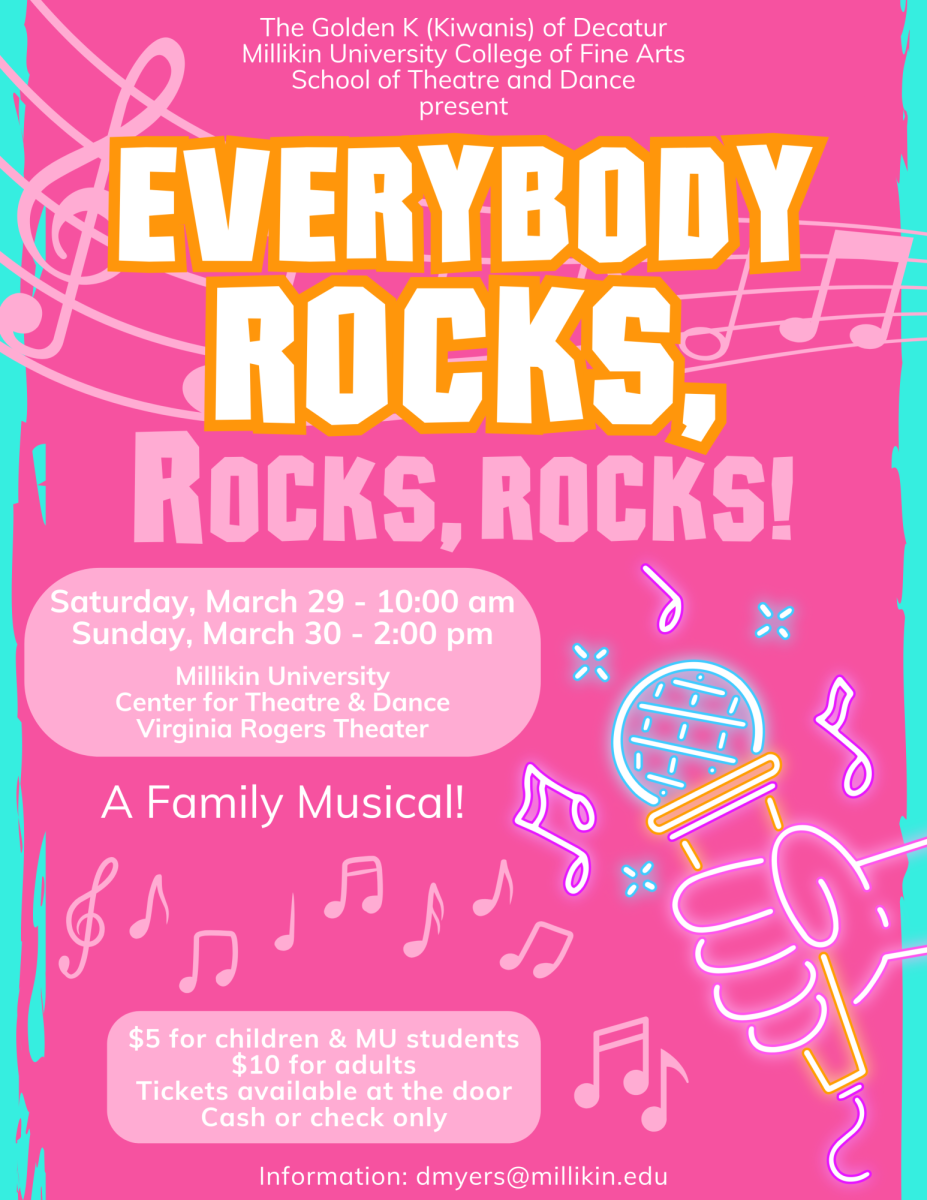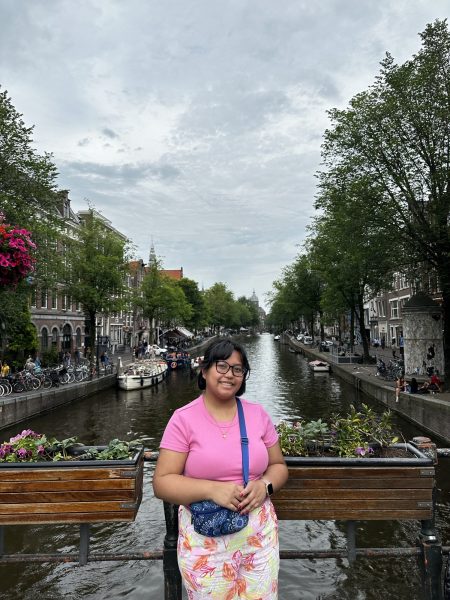Devising this year’s Children’s Show is underway and is about to rock your world.
The show tells the story of a girl aspiring to be a rock star, with a gecko and mosquito, journeying across lands of harmony, rhythm, and silence. The Golden K (Kiwanis) of Decatur supports the show, aiming to bring family audiences and community engagement.
The Golden K Club of Decatur is a service organization dedicated to making the world a better place for children through fundraising and service projects. The money raised goes to children’s activities such as the Scovill Zoo or the Children’s Museum.
Bringing stories to life with energy and imagination, the Children’s Show is a production designed to captivate young audiences through engaging performances and creative storytelling.
This annual family-friendly show has been running since 1994, with Myers involved in over 30 years of production. Recent productions, When the Clock Strikes 13 (2023) and Circus Olympus (2024), are either devised or scripted pieces.
Millikin’s performance-based learning approach shines once again through the Children’s Show, offering students a dynamic opportunity to explore the world of children’s theater.
“[The Children’s Show] is meant to give our students an opportunity to do theater for young audiences,” Myers said. “It’s a different kind of theater. The audiences are different, so you have to make sure your show is geared to who your audience is.
“For our students to learn, to perform, and to bring in an audience, that requires a different level of engagement, and storytelling is an incredible opportunity to develop their skills in children’s theater.”
Beyond the storytelling, the Children’s Show offers a fun, interactive experience that emphasizes its educational value.
“It’s an extravaganza of fun and deep meaning,” Meyers said. “So not only is it silly and goofy, but it’s also different types of voices that you get to see and hear.”
The show includes various elements like tap dancing, masks, American Sign Language (ASL), and original music, making it a diverse, engaging way for audiences to participate and connect with the material.
Because every audience is different, performers must adapt their approach to create an engaging experience. This is where devising comes in—a collaborative theater-making process where performers, directors, and designers build a production from the ground up.
Devising theater is similar to making up a play from scratch as a group instead of starting with a script. Instead of one person writing everything first, the actors, directors, and writers all collaborate to create the story, characters, and scenes through improvisation, discussion, experimentation, and collective creativity. It’s a mix of brainstorming, playing around, and rehearsing until a full performance takes shape.
“This started from nothing, absolutely nothing,” Meyers said. “With this kind of show, we’re going to come up with a lot of ideas, but 90% of them we’re going to throw out, and we keep that 10%, building out a script.”
Devising requires patience, flexibility, and trust in the creative process. While many ideas don’t make the final cut, each one plays a role in shaping the story, proving that sometimes the best moments emerge from the messiest beginnings.
“We were presented with these questions: ‘I want to be a rockstar because…,’, ‘Gecko?’, and ‘Mosquito?’” the co-director and costume manager Gillian Elliot said. “And then from there we spent two weeks figuring out who these characters are and what [a rockstar is] in everybody’s minds.”
As the team explored these ideas, they not only built a story but also discovered new ways to engage young audiences through playful storytelling and dynamic characters.
An example of a rehearsal goes like this: they are asked, “What’s a land of echoes? Go find three ways to portray it in 20 minutes.’
“Everyone returns with wildly different ideas, and that’s the fun of it,” Meyers said. “By constantly mixing groups, students collaborate in new ways, generating a range of creative concepts. We see it all—15 unique ideas—before choosing and expanding just one for the show.”
When it comes to trust and balancing ideas, the team takes a collaborative approach to decision-making.
Denise Myers explains that the guiding question is always, “What do we need for this show? What is the best idea, and how does it advance the story?” Elliot adds that the process isn’t dictated by just one or two people, but by an “idea committee” made up of musicians, writers, directors, and lead actors, all contributing their perspectives.
With so many voices in the room, Myers acknowledges that the process can be challenging at times.
“Sometimes it’s frustrating,” she said. “There are times where you just go, ‘I don’t know,’ but we’ll figure it out—not tonight, but we’ll figure it out.”
That same spirit of adaptability extends beyond the creative process this year, as the performance itself changes, moving from Albert Taylor Theatre to the Virginia Rogers Theatre.
This is the first time the children’s show will be performed in the Virginia Rogers Theatre. Myers explains that the space is open and flexible, which works well for their devised show. The simplicity of the set allows for easy transformation of the space using props and imagination.
The open stage enables the actors to create different environments quickly. The versatility of the theater allows the show’s world to constantly shift and evolve.
“It’s an open space,” Meyers said. “I think that’s what makes it so fun, is that the space can keep transforming, and we’re going to be in a river, and some umbrellas, and some trees, and…then that’ll go away, and something else will come in.”
This ever-changing environment enhances the immersive experience for both performers and audiences alike.
This year’s Children’s Show promises a unique, immersive experience that will captivate audiences of all ages.
Show dates are Saturday, March 29th, 2025, at 10:00 am and Sunday, March 30th, 2025, at 2:00 pm, located at Virginia Rodgers Theatre in the Center for Theater and Dance (CTD).
$10 for adults, $5 for children, $5 for Millikin students. Tickets are available at the door. Cash or check only. For more information email: [email protected].


